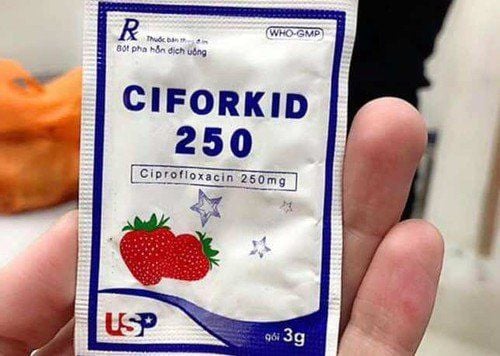This is an automatically translated article.
Charcoal is a drug belonging to the group of emergency and antidote drugs. In Charcoal, in addition to the main ingredient is activated carbon, it also contains excipients just enough to help ensure the volume, solubility, and stability of a Charcoal tablet. The drug is used in the treatment of abdominal pain caused by flatulence, dyspepsia, abdominal distension, reducing itching caused by dialysis, ...
1. What does Charcoal do?
With the main ingredient is activated charcoal - this is the active ingredient often used in cases of acute poisoning or overdose. Activated charcoal can absorb many toxic molecules in the intestine to its surface. Then, because activated charcoal is not absorbed through the digestive tract and excreted unchanged in the feces, activated charcoal will carry toxins with feces out of the body.
For the best effect, you should drink activated charcoal as soon as possible after drinking the poison. Activated charcoal is often used in the treatment of overdoses of paracetamol, tranquilizers, aspirin, ... However, for poisoning conditions such as alcohol poisoning, poisoning with heavy metals such as iron, lithium, poisoning. Potassium toxicity, acid poisoning, alkaline activated carbon has little effect. Therefore, depending on each specific case, consider using activated charcoal so that it is reasonable. In addition, studies have shown that activated charcoal is also effective in treating abdominal pain caused by flatulence, indigestion, and reducing itching caused by dialysis. In addition, activated charcoal also has the effect of whitening teeth, promoting oral health, used in some skin beauty products, removing dirt, toxins and bacteria on the surface of the skin.
2. Indications of the drug Charcoal
Charcoal drug is used in the following specific cases:
Used in the treatment of poisoning due to drug and chemical overdose such as: aspirin, paracetamol, atropine, digoxin, tranquilizers, barbitates, dextropropoxyphene, toxic mushrooms, oxalic acid, phenol, phenytoin, tricyclic antidepressants, phenylpropanolamine, ... Used in the treatment of intestinal infections because activated charcoal can absorb toxins secreted by bacteria in the intestinal tract. Digest. Used in diagnosis of uterine fistula, colonic fistula Treatment of abdominal pain caused by flatulence, indigestion, abdominal distension, relief of itching caused by dialysis. Charcoal is contraindicated in the following cases:
Patients with a history of allergy to activated charcoal Patients preparing for endoscopy Patients with intestinal obstruction, decreased intestinal motility, or aspiration In the drug Charcoal contains sugar White sucrose should be contraindicated in patients with rare hereditary problems of fructose intolerance, glucose-galactose malabsorption or sucrase-isomaltase deficiency.
3. Dosage of the drug Charcoal
Charcoal is used as prescribed by a doctor, you can refer to the dose of Charcoal as follows:
Dosage of Charcoal in the treatment of acute poisoning in adults:
Single dose: Use 25-100g mixed diluted in water, taken orally or pumped through a nasogastric tube once. Multiple dosing: Initial dose: Use 50-100g diluted in water, orally or pump through a nasogastric tube. Maintenance dose: Use 12.5g/hour, 25g/2 hours or 50g/4 hours until symptoms stop. Dosage of Charcoal in the treatment of acute poisoning in children
Multiple doses in children under 13 years of age: Initial dose: Use 10 - 25g diluted in water, orally or pumped through a nasogastric tube. Maintenance dose: 1-2g/kg body weight/2-4 hours/time Dose multiple times in children aged 13-18 years use the same dose as adultsLInitial dose: Use 50-100g diluted in water, orally or pump through a nasogastric tube; Maintenance dose: Use 12.5g/hour, 25g/2 hours or 50g/4 hours until symptoms stop. Dosage of Charcoal in the treatment of flatulence, dyspepsia, and abdominal distension Dosage for adults: 400-800 mg/day. Maximum dose 1200mg/day. Dosage for children: 400mg/day. Time to use Charcoal medicine for treatment of 5-10 days, if symptoms persist and do not go away, you should notify your doctor or go to the nearest medical facility for medical examination.
4. Charcoal side effects
Charcoal can cause unwanted effects including: black stools, black tongue, constipation, vomiting, diarrhea, gastrointestinal obstruction, worsening of symptoms in people with disorders of porphyrin metabolism, ....
5. Be careful when using Charcoal
Caution when used for patients with liver disease, kidney disease, ... Do not use Charcoal for children under 1 year old without the permission of a doctor. Activated charcoal in Charcoal can be combined with other drugs to reduce the effectiveness of the drug, which can be dangerous, so do not take Charcoal with any other medicine, take Charcoal at least 2 hours before or 1 hour after taking another medicine. There is not enough research and evidence to show that Charcoal is harmful to an unborn baby or newborn. Therefore, pregnant and breast-feeding women before taking Charcoal should always consult their doctor, weigh the benefits more than the risks, use the drug only when absolutely necessary.
6. Drug interactions
Charcoal medicine may interact with the following drugs:
When Charcoal is combined with drugs such as: tricyclic antidepressants, digoxin, paracetamol, theophylline, aspirin, Charcoal will reduce or prevent the absorption of these drugs. Combining Charcoal with medications for constipation can cause electrolyte imbalances or other dangerous problems. Store Charcoal medicine at room temperature, in a cool, dry place, away from light and reach of children.
Please dial HOTLINE for more information or register for an appointment HERE. Download MyVinmec app to make appointments faster and to manage your bookings easily.













